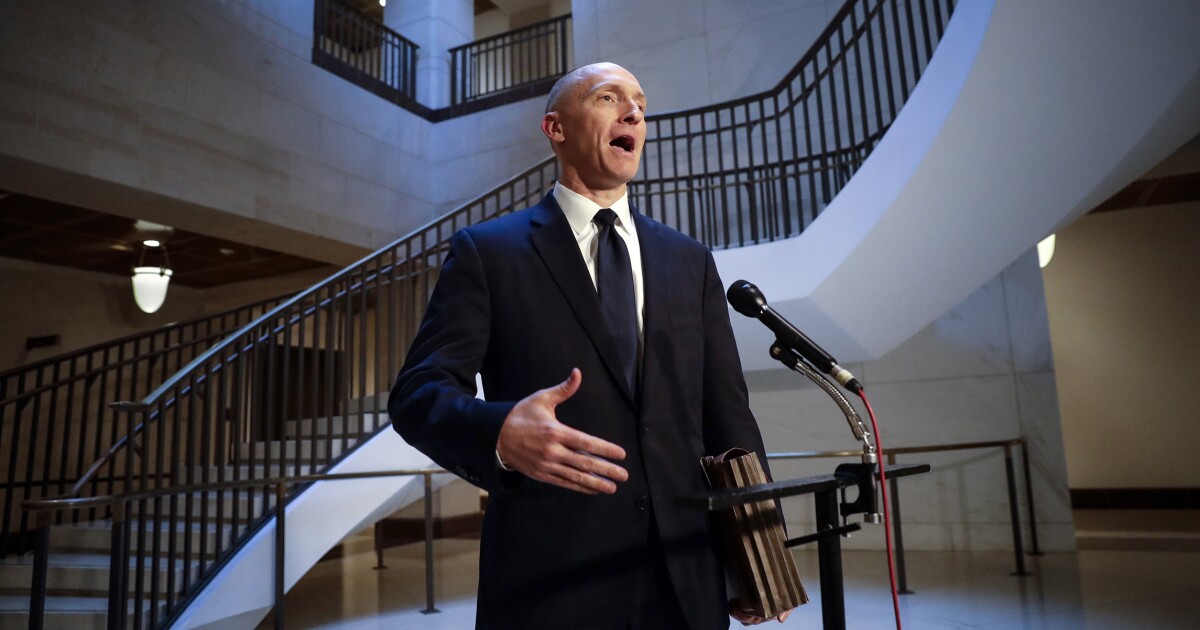

A federal judge dismissed Carter Page’s lawsuit against fired FBI Director James Comey, the FBI, and others involved in the improper Foreign Intelligence Surveillance Act snooping that had relied on British ex-spy Christopher Steele’s dossier.
Judge Dabney Friedrich relied on her interpretation of the criminal statutes that Page alleged the FBI officials had violated when she ruled against the onetime Trump campaign associate who was surveilled under FISA. Friedrich was appointed to the U.S. District Court for the District of Columbia by then-President Donald Trump in 2017.
“Page alleges that the individual defendants violated §§ 1809(a) and 1810 both by unlawfully engaging in electronic surveillance and using or disclosing the fruits of that surveillance. … Each defendant claims that Page fails to sufficiently allege that he or she violated the statute,” the judge said Thursday. “The Court finds that the claims are not time-barred but that Page does not state a claim against any of the individual defendants.”
The judge added: “This plain-text understanding — that Congress allowed suit against only those who conduct unauthorized surveillance, and not those who at the application stage mislead the [Foreign Intelligence Surveillance Court] to approve that surveillance — may seem odd. But it is not so ‘absurd when considered in the particular statutory context,’ as the Court must.”
The November 2020 lawsuit by Page was filed against Comey, fired FBI Deputy Director Andrew McCabe, the bureau, the Department of Justice, fired FBI Deputy Assistant Director of Counterintelligence Peter Strzok, former FBI lawyer Lisa Page, former supervisory special agent Joseph Pientka, FBI agent Stephen Somma, supervisory intelligence analyst Brian Auten, and convicted ex-FBI lawyer Kevin Clinesmith, with Page condemning their “unjustified and illegal actions” and “unlawful spying.”
WHO IS STEELE DOSSIER SOURCE IGOR DANCHENKO?
DOJ Inspector General Michael Horowitz’s December 2019 report on FISA abuse concluded the FBI’s investigation was filled with serious missteps and concealed exculpatory information from the FISA court. Horowitz criticized the bureau for at least 17 “significant errors and omissions” spanning from the fall of 2016 to the summer of 2017.
The FISA filings relied upon a dossier compiled by Steele, who’d been hired by Fusion GPS, which in turn was hired by Hillary Clinton’s presidential campaign and the Democratic National Committee through Clinton campaign general counsel Marc Elias and the Perkins Coie law firm.
Page was never charged with any wrongdoing.
“Some of the defendants, such as Comey, McCabe, Strzok, and Lisa Page, allegedly approved, encouraged, and facilitated Page’s investigation and the warrant applications,” the judge ruled Thursday but added, “Absent from the complaint is any claim that these four defendants participated in drafting or substantively reviewing the faulty applications themselves, let alone that they performed the FISA surveillance and acquired Page’s communications.”
McCabe and Comey pushed to include allegations from Steele’s dossier in the 2017 intelligence community assessment on Russia, and the dossier was summarized in a classified annex.
Strzok, Page, and Pientka were all key members of the Trump-Russia Crossfire Hurricane investigation. Horowitz said Somma was “primarily responsible for some of the most significant errors and omissions in the FISA applications,” and Auten interviewed Steele’s alleged main source, Igor Danchenko, in 2017.
Danchenko was charged by special counsel John Durham last year with five counts of making false statements to the FBI. Durham says the comments were about the information Danchenko provided for the Steele dossier. Horowitz concluded that Danchenko eventually undermined Steele’s unfounded claims of a “well-developed conspiracy” between Trump and Russia.
Whistleblower allegations also emerged last month that Auten opened an assessment in August 2020 that was used by FBI headquarters to wrongly label accurate information about Hunter Biden as false.
Durham’s investigation has led to one guilty plea, with Clinesmith admitting he fraudulently changed the wording of a CIA email to say that Page was “not a source” for the agency, even though the FBI was told that Page had been an “operational contact” for the agency.
The judge pointed to Pientka, Auten, Somma, and Clinesmith.
“Even for the four defendants who did contribute to the material errors in the applications, Page does not claim that they ‘engaged in electronic surveillance,’ as defined,” the judge ruled.
“If proven, these allegations clearly demonstrate wrongdoing,” the judge said. “Indeed, Clinesmith entered a plea in United States v. Clinesmith for making a false statement … but Page does not allege that any of the individual defendants, including the unknown John Doe defendants and those most responsible for the applications’ critical errors, took part in obtaining the surveillance information, either by setting up the devices or gathering or listening to Page’s communications.”
The judge ruled: “Thus, the Court cannot plausibly infer from this complaint that any of the individual defendants, known or unknown, ‘engaged in electronic surveillance,’ in violation of §§ 1809(a) and 1810.”
CLICK HERE TO READ MORE FROM THE WASHINGTON EXAMINER
A total of four FISA applications and renewals against Page were signed off on by FBI and DOJ leadership and approved by the FISA court. Comey, McCabe, former Deputy Attorney General Sally Yates, former Deputy Attorney General Rod Rosenstein, and former acting Attorney General Dana Boente all signed off on it.
FBI Director Christopher Wray, who has repeatedly called the Horowitz findings “utterly unacceptable,” concurred with the DOJ’s conclusions that at least some of the FISA surveillance against Page was illegal.







